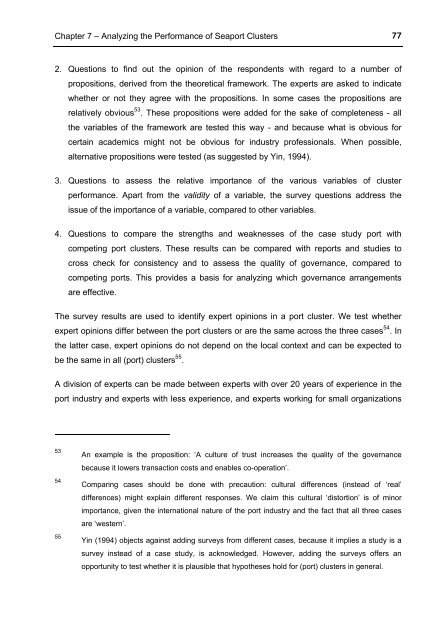The Performance of Seaport Clusters - RePub - Erasmus Universiteit ...
The Performance of Seaport Clusters - RePub - Erasmus Universiteit ...
The Performance of Seaport Clusters - RePub - Erasmus Universiteit ...
Create successful ePaper yourself
Turn your PDF publications into a flip-book with our unique Google optimized e-Paper software.
Chapter 7 – Analyzing the <strong>Performance</strong> <strong>of</strong> <strong>Seaport</strong> <strong>Clusters</strong> 77<br />
2. Questions to find out the opinion <strong>of</strong> the respondents with regard to a number <strong>of</strong><br />
propositions, derived from the theoretical framework. <strong>The</strong> experts are asked to indicate<br />
whether or not they agree with the propositions. In some cases the propositions are<br />
relatively obvious 53 . <strong>The</strong>se propositions were added for the sake <strong>of</strong> completeness - all<br />
the variables <strong>of</strong> the framework are tested this way - and because what is obvious for<br />
certain academics might not be obvious for industry pr<strong>of</strong>essionals. When possible,<br />
alternative propositions were tested (as suggested by Yin, 1994).<br />
3. Questions to assess the relative importance <strong>of</strong> the various variables <strong>of</strong> cluster<br />
performance. Apart from the validity <strong>of</strong> a variable, the survey questions address the<br />
issue <strong>of</strong> the importance <strong>of</strong> a variable, compared to other variables.<br />
4. Questions to compare the strengths and weaknesses <strong>of</strong> the case study port with<br />
competing port clusters. <strong>The</strong>se results can be compared with reports and studies to<br />
cross check for consistency and to assess the quality <strong>of</strong> governance, compared to<br />
competing ports. This provides a basis for analyzing which governance arrangements<br />
are effective.<br />
<strong>The</strong> survey results are used to identify expert opinions in a port cluster. We test whether<br />
expert opinions differ between the port clusters or are the same across the three cases 54 . In<br />
the latter case, expert opinions do not depend on the local context and can be expected to<br />
be the same in all (port) clusters 55 .<br />
A division <strong>of</strong> experts can be made between experts with over 20 years <strong>of</strong> experience in the<br />
port industry and experts with less experience, and experts working for small organizations<br />
53 An example is the proposition: ‘A culture <strong>of</strong> trust increases the quality <strong>of</strong> the governance<br />
because it lowers transaction costs and enables co-operation’.<br />
54 Comparing cases should be done with precaution: cultural differences (instead <strong>of</strong> ‘real’<br />
differences) might explain different responses. We claim this cultural ‘distortion’ is <strong>of</strong> minor<br />
importance, given the international nature <strong>of</strong> the port industry and the fact that all three cases<br />
are ‘western’.<br />
55 Yin (1994) objects against adding surveys from different cases, because it implies a study is a<br />
survey instead <strong>of</strong> a case study, is acknowledged. However, adding the surveys <strong>of</strong>fers an<br />
opportunity to test whether it is plausible that hypotheses hold for (port) clusters in general.

















